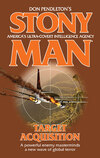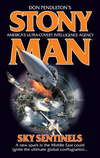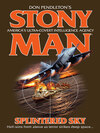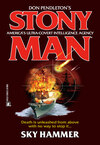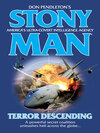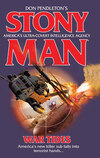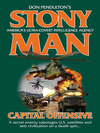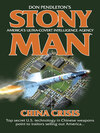Kitabı oku: «Target Acquisition», sayfa 4
CHAPTER SIX
McCarter was thrown to his knees. He grunted with the impact as something heavy and wet struck him between the shoulder blades, then he looked down and saw a severed arm lying on the floor. He felt the heat of the raging blaze behind him.
He struggled to his feet.
“Talk to me, people!” Akira Tokaido shouted over the line. “Talk to me!”
McCarter didn’t answer but lunged forward. Abu Hafiza was screaming from his shattered thighs but was pulling a Jordanian JAWS pistol from out of his robes. McCarter slashed out with his M-4. His bayonet caught the man across the forearm, slicing a long ugly gash. The Iranian screamed again as he dropped the pistol.
Still on all fours McCarter scrambled forward, wielding the M-4 in one fist. The blade of the wicked M9 bayonet jabbed into the soft flesh of Abu Hafiza’s throat and pushed the man backward.
“Freeze!” McCarter snarled in Arabic. “Move one fucking millimeter and I’ll put your brains on the wall!” He lashed out with the bayonet again, lancing the tip into the meat of the Iranian’s shoulder and opening a small wound.
“Speak to me, Phoenix!” Tokaido hollered again.
“Manning up,” Gary Manning answered. “That was very danger close, my man,” the Canadian special forces veteran said.
“Pescado, is good,” Encizo said. “I’m knee deep in tango guts, but that blast blew the front off the building.”
“Copy that,” Tokaido said. “They had two platoon-size elements as reinforcements at the door. Forty, fifty guys all bunched up at the entrance.”
“McCarter up,” McCarter said. “But Cal took a round and I have our boy.” He paused. “If we’re clear, I need help.”
Instantly there was a reaction from behind him and the massive frame of Gary Manning appeared by his side as Encizo scrambled over to pull security near the prone Calvin James.
Encizo leaned in close, his eyes hunting for enemy motion from behind the lenses of his protective mask. “Speak to me,” he demanded. “You okay, bro?”
James turned his head and opened his eyes. He opened his mouth to speak but no sound came out. Encizo, ears still ringing from the Hellfire blast, shook his head to clear his hearing.
“Speak, bro!” the Cuban demanded.
James lifted his head and muscles along his neck stood out with the effort. His lips formed the words under his protective mask and his eyes bulged with his effort under the lens but no sound came out. Finally there was a rush of air through the blunt nose filter.
“That hurt!” he wheezed. “Jesus, that hurt. I think I cracked my ribs.”
“Is he good?” McCarter demanded over one shoulder. His weapon’s muzzle never wavered from Abu Hafiza’s face. “Is he good?”
Beside the Briton, Manning fired his M-60E in a short 4-round burst. A crawling Iraqi terrorist shuddered under the impact of the 7.62 mm slugs and lay still. Encizo turned toward the Phoenix Force leader and shouted back.
“Yeah, he just had the wind knocked out of him. Maybe bruised ribs, maybe cracked—we don’t know, but he’s ambulatory.”
“He’s also right goddamn here,” James snapped, sitting up. “He doesn’t need you talking about him as if he were incapable of speech.”
“Good,” McCarter replied, his voice echoing weirdly under the mask. “I got our boy but he needs patching up before we yank him back to Wonderland.” McCarter switched to his throat mike. “Akira, how we look out there?”
“You got vehicles coming up the street. You’ll have more bad guys on site very shortly. I’m still sitting on Hellfire number three.”
“Fine. Hit ’em at the gate and cause a further choke-point but save number four for my direction.”
“Understood.”
McCarter pulled back as James moved forward, medic kit in hand. Abu Hafiza looked at the black man with real hatred as the ex-SEAL ripped open the thobe and began to treat the Iranian’s wounds.
“Give him morphine,” McCarter said as he rose. “We’re going to have to carry him anyway with those leg wounds. It’ll keep him docile.”
“I’ll be the one to play doctor here,” James said.
“Fine, you’re the medic—what do you want to do?”
“Probably going to give him a heavy dose of morphine to keep him docile.”
“Whatever you think is best.” McCarter shook his head.
Encizo spoke up. “What about the son of a bitch Saheed el-Jaga?”
McCarter looked over at the Cuban combat swimmer. “You guys tag and bag him?”
“Yep,” Manning interrupted as he rose. “We got him against the wall.” The big Canadian began to move down the length of the room toward the blazing hole in the building, checking each of the downed bodies as he did so.
“We aren’t prepped to carry two deadweights out of here,” McCarter pointed out.
“What’s the penalty for treason?” Manning asked.
“Firing squad,” Encizo said, an ugly smile splitting his face.
James looked up from bandaging the glowering Abu Hafiza. “Where will we find volunteers?”
McCarter turned, lifted his M-4 to his shoulder and pulled the trigger. Across the stretch of floor broken by the rapidly thinning clouds of CS gas the corrupt Iraqi police officer Saheed el-Jaga caught the 3-round burst in the side of the head.
Blood gushed like water from a broken hydrant and the blue-gray scrambled eggs of his brains splashed across the floor with bone white chips of skull in the soupy mess. McCarter lowered his smoking M-4.
The ex-SAS commando leaned down close to the wounded Iranian. “Abu Hafiza, you see I’m a serious bastard now?”
The al Qaeda commander paled under the scrutiny of the coldblooded killer. His eyes shifted away from the death mask McCarter’s face had become. Then he jerked and winced as James unceremoniously gave him an intramuscular shot of morphine.
The black man smiled with ghastly intensity at the captured Iranian terror master. “Don’t worry,” he said. “If we shoot you, it’ll only be in the gut.”
Manning and Encizo reached down and jerked the now stoned Abu Hafiza to his feet. McCarter spoke into his throat mike. “Akira, how we look?”
“Clock’s ticking. You got stubborn bad guys trying to dig their way through the burning barricade I made out of the first-wave vehicles. I’m still sitting on my last Hellfire.”
“Good copy,” McCarter said. “We’ll be rolling out the back door in about ten seconds. Why don’t you go ahead and blow me a hole out the back fence now?”
“One escape hatch coming up,” Tokaido replied.
“Phoenix,” McCarter said. “We are leaving.”
En route to Bolivia
IN THE BACK OF THE Cessna executive turbojet Able Team prepared for their mission briefing. Scrambled with their preassembled kits directed by Barbara Price, the Stony Man direct-action unit had been wheels up and flying south even before Hal Brognola had finished being fully briefed by the President.
Now, via sat link the big Fed and director of the Justice Department’s Sensitive Operations Group gave them a rundown on the situation.
“Currently FBI counterintelligence, counterterror and hostage-rescue units are scrambling to deal with a crisis. In Boliva, Juan Evo Morales holds power. A committed socialist and champion of the coca-leaf growers, he is a strong ally of the Venezuelan strongman Hugo Chavez, and no friend of the United States.
“A plane filled with U.S. citizens has been taken hostage in the eastern lowlands where thick tracts of Amazonian rainforest carpet the topography. Officially the Morales government is helping the U.S. with the situation. Behind the scenes the government is restricting the movement, investigation and resource deployment of the FBI field team in order to maintain ‘sovereign integrity.’
“NSA has managed to discover that covertly, the Bolivian special forces, the Polivalente, are running a joint operation with Venezuela’s DISIP, or Directorate of Intelligence and Prevention Services. Faced with this obstruction we need you to run a simultaneous black operation to locate and free the kidnapped hostages independent from the official FBI efforts. You must infiltrate the country, acquire intelligence, perform tactical reconnaissance and execute the rescue.” Brognola paused. “Tactical specifics will be given to you once you arrive in Bolivia.”
Schwarz cocked an eyebrow and turned toward Blancanales. “Is it me or does the old man seem to be getting even more blasé as we pull off one impossible stunt after the other?”
Blancanales shrugged. “What am I going to do at my age? Start over and teach school?”
Lyons leaned forward and addressed Brognola through the sat link system. “No worries. We’re on it.”
La Paz, Bolivia
THE TAXI took Lyons away from the more affluent area and into the poorer neighborhoods, far from the Hyatt hotel, American consular branch office and the giant grocery store. Here Colombian refugees formed a strong minority, completely dominating some neighborhoods stacked with poorly constructed tenements and scattered with small shops.
This fact was punctuated to Lyons by his driver, named Jose, who spoke serviceable if broken English. At one point he noted to Lyons that they had entered an area exclusive to Colombians, a tent city from 1978 that had grown up into a labyrinth of winding, narrow streets separating concrete apartment buildings and one-room shops of every description.
After fifteen minutes of travel, the taxi entered another Colombian enclave and stopped in front of a four-story apartment building. Standing on the street, waiting for him, was Hermann Schwarz in street clothes. The American had allowed his beard to grow in under his thick mustache.
Lyons paid the driver and got out of the cab. Schwarz was holding open a steel door and he nodded and smiled in greeting.
“Que pasa, jefe?” he said, letting Lyons through the gate into a small courtyard, then directing him into the building itself. Lyons nodded a greeting and began to ask the Able Team commando a question, but Schwarz shook his head and whispered, “Upstairs.”
Lyons followed Schwarz as they climbed four stories up a narrow, bare concrete staircase. At each landing there was a large square window open to the outside. On the fourth floor the two men entered a stark, poorly lit hallway. At the end of the hall Lyons saw a woman in a traditional dark dress duck into a doorway to avoid them.
Obviously waiting for them, Rosario Blancanales, stubble-faced and dressed identically to Schwarz in street clothes, opened the door to their apartment. Lyons entered the room, shaking Blancanales’s hand once he was inside. Schwarz shut the door behind them and flipped a series of dead bolts closed.
Immediately upon entering the apartment, Lyons saw that there was a short, alcove-style hall to the left leading to an open closet and the bathroom. A U.S. Claymore antipersonnel mine was set up in the entranceway, angled at the door so the back blast would be funneled into the alcove. The ignition cord trailed down the hall, taped to the ground to avoid tripping anyone, and leading around a corner.
“What’s up?” Lyons asked. “Didn’t want anyone hearing us speak English?”
“I want to avoid it as much as possible.” Schwarz nodded. “Blancanales and I might fit in better than McCarter or Hawkins would, but nobody around here’s really fooled. English is pretty common here but it shouts ‘outsider’ in a way that makes me nervous in these Colombian ’hoods.”
“It’s like in my old neighborhood when I was growing up,” Rosario Blancanales added. “Everybody knows who belongs in the ’hood. Cops try to send in a plain-clothes and he was always spotted. The gangs know if a guy comes from three streets over, let alone from out of town. We look like the Bolivian version of lost tourists come to the big city as long as we don’t open our mouths.”
“It’s only going to get worse once we make our final approaches,” Lyons observed.
Blancanales shrugged. “Like I said, Gadgets and I are better than McCarter or Hawkins and in crowded markets or just out and about we’ll move easier. We knew it was going to be tough. You look like the giant gringo you are, my friend.”
They led Lyons deeper into the cramped four-room apartment. The walls and floor were of the same bare concrete as the staircase. Lyons realized there would be no insulation, though the windows at least had glass in them.
“Plumbing okay?” he asked.
“Toilet and shower are weak but working. Don’t drink the water,” Blancanales answered.
“How’s it going?” Lyons asked, meaning the surveillance operation.
Blancanales led him to the large common area at the rear of the apartment. Lyons saw a battered old futon next to a kerosene stove and several battery-operated lanterns. Schwarz and Blancanales had put down foam mattresses and sleeping bags on the concrete, with an additional one meant for Lyons.
A Soviet Dragunov 7.62 mm sniper rifle with the standard PSO-1 scope mount was set up on a bipod in the middle of the room. Against the wall were three AK-104 Kalashnikov carbines. On a card table near the couch and stacked weapons sat a VINCENT sat-com unit, a laptop, two Nikon cameras—one digital and one 35 mm—as well as a satellite phone.
“The Bureau set us up good,” Blancanales said. “Your wish list for weapons and equipment was waiting for us when we got here. They got us Jordanian pistols instead of the more generic Makarovs, but since they’re used by the Bolivian army I didn’t bitch.”
Lyons grunted. The Viper JAWS—Jordanian Arms & Weapon System—had a great reputation for a 9 mm pistol, especially when compared to the older Soviet Makarov and Tokarev, and was the product of a joint American-Jordanian effort. He supposed that with the weapons going into service with the Royal Jordanian Army it was feasible that some would have made it out onto the black market. The fact that the Bolivian military services had all been outfitted with them only helped matters.
“Good enough. What about our good Juan Hernandez?” Lyons asked.
“Take a look for yourself,” Schwarz said, and indicated where the Dragunov had been set up.
The designated infantry support weapon was set up on the ground on a foam shooter’s pad. It was pointed out of a sliding-glass door that opened up on a railing around a patio that extended about six inches out. The glass door opened up on a narrow alley, and Blancanales and Schwarz had hung drapes, keeping them only open a few inches, to avoid being seen by anyone across the way.
Lyons settled into position. The PSO-1 scope was angled through the wide-set wrought-iron bars of the balcony and out toward the mouth of the alley, which opened up on a busy avenue. The crosshairs of the sniper rifle were focused on a balcony across that street, the fifth one up from the bottom and two over from the left edge of the target building. The balcony there was as narrow and unadorned as the one attached to Able Team’s own safehouse.
Inside the apartment Lyons could clearly distinguish the front door through his sniper scope. A battered old television with a rabbit-ears antenna played what Lyons took to be a local soap opera. He had a clear image of the back of a large, balding head facing away from the open balcony.
“Looks like our guy,” Lyons said. “I guess. The FBI triangulated the communications of the Bolivian army commander in charge of the rescue to here?”
“Yep exactly. Akira did a computer enhancement match on photos we took. It came up on an NSA data file. The guy is a communications officer for Colombian intelligence. He’s working as a scramble relay for Caracas.”
“Ugly bastard,” Lyons grunted.
“Got him?” Blancanales asked. “Good. Now come here. I want to show you our little glitch.”
“Christ,” Lyons muttered as he stood. “There’s always a glitch.”
Blancanales led Lyons to the edge of the drapes covering all but two inches of their apartment balcony. Lyons stood at the edge of the curtain and looked out. He heard the sounds of the street, smelled exhaust fumes from the cars. In the distance he could hear a radio blaring latino music through cheap loudspeakers. Heavy carpets aired out over balconies. Clotheslines filled the space above the street between buildings, draped with laundry.
On the street women in traditional blouses and skirts hustled by on errands while men in dirty jeans and battered old sandals rode in threes and fours in the open backs of pickup down the narrow avenue. He saw street vendors selling vegetables and cutting meat from hanging carcasses.
The unemployed lounged in little clusters and argued and laughed with animated hand gestures. School-age children kicked grimy soccer balls in the gutter. Rebar struts stuck from the unfinished corners of old buildings.
“Look down, against the wall, across the alley. See him?”
Lyons looked down. He saw what appeared to be a vagrant dressed in filthy Western shirt and pants under a grimy poncho. His beard was patchy, almost mangy, and the man’s overall appearance was completely unkempt. Lyons narrowed his eyes. There were two empty bottles of the potent Bolivian beer called Orso lying empty beside the man who clutched a brown paper bag.
Lyons frowned. “A drunk? In the open?”
“Exactly. Here.” Blancanales handed Lyons a compact pair of Zeiss binoculars. “Check out his right ear under the ball cap.”
Lyons took the offered Zeiss binoculars and zeroed in on the lounging man. A small earpiece was fitted into the man’s ear. Lyons grunted at the wireless communications tech. “Pretty upscale for a gutter drunk. Our boy Juan is being watched. I’m guessing not by Bolivian security, either, considering how the observer’s screwing it up.”
“Probably it’s the Venezuleans doing overwatch on their boy. A secondary security operation,” Schwarz said.
“Hell,” Blancanales snorted. “Pretending to be a drunk, in Bolivia? I think that rules out any first-tier Western operators, as well.”
Lyons narrowed his focus on the glasses. He took in how the man’s hawk nose was more pronounced from having obviously been broken more than once. “You don’t think he’s on to us?” Lyons handed Blancanales back the Zeiss binoculars. “What happens when Juan leaves his apartment? That guy tail him?”
“No.” Schwarz smiled. “Another guy, taller and thinner, tails him in a white Celica. They’re definitely following our good Mr. Juan Hernandez. I followed him following Juan shopping one day. I could have sliced his throat at any time, he was positively asleep, real tunnel vision.” The ex-Green Beret mimed drawing a finger across his neck. “I took some photos instead. Besides, what’s the range on a wireless earpiece like that? Even with the receiver in the bag? We’re clean for bugs in here and he’d be set up differently if he was using a parabolic mic. They must already have a bug in Hernandez’s apartment.”
“I assume you got film on that jackass down there, as well?” Lyons asked.
“Yep.” Blancanales nodded. “Sent it off to Bear. He said he’ll get back to us.”
“We have to know who they are before we roll,” Lyons said. “The Bolivians could have tipped someone or Venezuela could have sent a team hoping to ambush anyone who checks Juan Hernandez out. Whoever they are they’ve just made number one on our list of priorities,” Lyons decided. “What happens at night?” he asked, pensive.
“Third man,” Schwarz answered. “Juan isn’t exactly a playboy. They keep the indigent in place until dark, then they have a nightshift guy, different than the daytime shadow, in a late-model Ford V-8 van. He parks in the alley crawls into the back and pulls the curtain. Must have a sibling transceiver to the one used by our Mr. Bum-by-day down there.”
“He goes first, then,” Lyons said.
CHAPTER SEVEN
Able Team settled in to wait.
Lyons took one of the 9 mm Viper JAWS pistols and kept it on him. He changed into street clothes and a poncho. With his darkly tanned complexion and two-day beard he didn’t stand out awfully, but he knew better than to think he could pull off any complicated subterfuge.
They made strong coffee and took turns behind the PSO-1 scope, watching Juan Hernandez’s apartment. The Venezuelan electronic intelligence specialist was a diligent man. The spook in the alley outside whiled away the time with a patience that Lyons had to admit was professional.
While Schwarz took a watch behind the sniper scope the sat-phone on the card table next to the laptop buzzed. Blancanales picked it up. “Go,” he said.
He listened for a minute and Lyons heard the smile in his voice when he answered. “Nice, Bear, nice.”
While Lyons watched, Blancanales moved to the laptop and nudged the finger-mouse pad to disrupt the screensaver. A rectangle graph showing an incoming download appeared. Once the download was complete, Blancanales said, “Got it. We’ll call as we move forward. Out.”
He hung up the phone and clicked on the download icon. Instantly classified photos with accompanying text appeared on the screen. Lyons came in close and studied the screen.
“Got a match on DEA international files. Cross-hit in Interpol. These guys are cartel mob freelancers,” Lyons read.
“Venezuelans?” Blancanales mused. “We got cocaine cowboys pulling security on a Colombian intel op.”
“Blackmail,” Lyons grunted. “Maybe, anyway. But more likely there’s a power struggle in Chavez’s crews. The army doesn’t trust intel, or intel the army, or something. So one side called in outside players they could trust. They’re here because someone is afraid someone is running Juan Hernandez down. If they were a hit team they’d have taken him out by now.”
“Christo,” Schwarz agreed from behind the rifle. “They’re Colombian. They would have blown up the whole damn building or gone in and chewed him up with a chain saw in front of his family by now if they’d been paid to take him out.”
“So we take them out?” Blancanales asked Lyons.
“We can’t have them at our six o’clock when we go in after Juan,” Lyons said, thoughtful.
“We take them out, then whoever called in the shadow will know we’re in Bolivia and onto Juan,” Schwarz pointed out.
Lyons ticked off his points on his fingers, one by one. “This op is bloody wet already. Subterfuge will only take us so far. Speed and aggression is our key now, just like always. We hit them. We hit Juan. We hit the plane.”
Schwarz and Blancanales nodded.
“So we take ’em out before we interview Juan,” Blancanales stated.
“Yes,” Lyons replied. “But I want to make sure I get every last one of them possible. Not just the point men.”
“Find the nest?” Schwarz said.
“And clean it out,” Lyons finished. “The clock is ticking. We need to interview Juan. We can’t do it with that surveillance and I’m not predisposed to letting Colombian hitmen run around at will if I can have anything to do with it.”
“I heard that,” Schwarz said.
“I think we have an understanding,” Blancanales said. “We go in, shoot and loot. At best we get some paperwork, a hard drive and/or some cell phones. Otherwise we simply put some bad operators out of business. Once our six o’clock is clear, we start stage two immediately.”
“Win-win situation,” Lyons said.
“THEY’RE ON THE FIFTH floor,” Schwarz said. “Room 519. There’s at least three of them in there but I think more like twice that.”
“Building materials?” Blancanales asked.
“Reinforced concrete for load-bearing structural, but only Sheetrock covered by wood between rooms. The doors have a lock, a single dead bolt and a security chain.”
“Windows?”
“Commercial variety. Set in the wall with no balcony. They open inward with a metal-clasp locking mechanism. The glass is set into four even quadrants of windowpane around standard molding and wood frames. High quality but not security level.”
“Wall penetration will be a problem with our weapons. Even the nine millimeters,” Lyons said.
“C-2 breaching charges on the door and shotguns with buckshot or breach-shot for the takedown?” Blancanales suggested.
“What’s security like in the hotel?”
“They have a Bolivian police officer out front armed with a pistol and a submachine gun. He liaisons with hotel private security, who have a heavy presence in the lobby and restaurant area. They make hourly passes through the guestroom halls. They all carry 9 mm side arms,” Schwarz answered. “I think we could get in and do the takedown. It’s getting out without slugging through security forces I’m doubtful of.”
“Position to snipe on the window?” Blancanales asked.
“Negative. The Inca Mall is across the street. Seventy-five thousand square feet. No defilade and no angle other than up-trajectory. Lousy for shooting.”
“Yes, but does it have frozen yogurt? You know how I feel about my frozen yogurt.” Blancanales laughed.
“That kind of exposure rules out rappelling down the outside, even if we could get to the roof.” Lyons rubbed at his beard, thoughtful.
“Bait and switch followed by a bum rush?” Schwarz suggested.
“How do we get out?” Blancanales countered.
Lyons smiled. “Schwarz, I’ll need you to find us a good covert LZ on the edge of the city, out toward the jungle, and pinpoint the GPS reading.”
“That’ll work. Depends on how fast Stony Man can get us a bird. This’ll have to be black from JSOC, and even from FBI. And fast. Very goddamn fast,” Blancanales said.
“Has Barb ever let us down yet?” Lyons asked.
SCHWARZ WALKED OUT of the hotel and dodged traffic as he crossed the busy street. Blancanales pulled out from the curb and met him as he crossed the median. Schwarz opened the passenger side door and slid into the seat.
“It’s a go,” he said.
“Good,” Lyons replied from the backseat of the vehicle. “Let’s do it.”
Driving quickly, the Stony Man team circumnavigated the luxury hotel and pulled into the parking lot of the urban mall, quickly losing themselves among the acres of parking for up to 1,500 vehicles. A State Department courier with no association to the mission would pick up the vehicle ten minutes after Able Team left the area.
Over the horizon, in the hot Bolivian night, Jack Grimaldi was already inbound in an AH-6J Little Bird attack helicopter. The clock had started running on a tightly scheduled and overtly aggressive Able Team operation. Dressed in street clothes under colorful regional ponchos, the men moved quickly toward their objective.
The hotel loomed above them as they crossed the street. Lyons felt his frustration rising over the broken jigsaw that was the international web in play around the hostaged Americans. Terrorists were using violence to spread fear, and Bolivian officials tasked with helping those innocents had turned against the helpless and entered into a Faustian arrangement with other evil players on the world stage—the Venezuelan intelligence apparatus bolstered by narco-mercenaries.
With hopes of little more than causing embarrassment to the U.S., two governments had become complicit in the murder of innocents for cheap political gains.
Now Lyons had an opportunity to do what he did best: go blood simple. He intended to seize the chance to vent his frustrations in righteous wrath against violent international criminals. It was a relief, a short-lived blessing.
Walking fast, Able Team moved onto the sidewalk behind the hotel. They sweated freely in the midnight air, dressed as they were with body armor and various weapons and tools for instant use once the dynamic entry began. The ornate wall ringing the hospitality structure was broken by a gate opening up on the loading dock where deliveries were made.
Bolivia was a security-conscious nation in a volatile region. Yet its problems were minor compared to other neighboring states, and the well-developed sense of paranoia evident in Colombia, Venezuela or even Panama was largely missing despite sporadic terrorist attacks and the heavy presence of narcotics trafficking. As such its security was as capable of being exploited as those in other, more violent nations.
They reached the back gate, hands sliding into black driving gloves of kid leather. As one, the three men reached up and swept their brightly colored ponchos off to one side, leaving them tumbled and forgotten on the ground. Black leather and canvas combat boots trampled the woven cloth as they sprang into action.
The black balaclavas were pulled into place, obscuring the Able Team commandos’ faces from internal CCTV cameras. Schwarz pulled a pair of short-handled bolt cutters from off his vest as Blancanales grabbed the chain and padlock looped around the chain-link fence gate and offered it up.
Schwarz cut through the links in one easy motion. Blancanales pushed the fence gate open as Schwarz dropped the bolt cutters next to the forgotten ponchos on the ground. Able Team rushed through the opening, Schwarz taking the lead.
Each man carried a Viper JAWS 9 mm pistol at either shoulder or hip and all three wielded Saiga 12K Russian .12-gauge assault shotguns with folding stocks and shortened barrels. The 8-round box magazines went into a weapon designed on the AK-74M paratrooper carbine. Loaded with No. 1 buckshot of 16 pellets of .30-caliber diameter, the rounds were considered the most effective man-stoppers, even over double-aught buckshot loads. They were also considered generally more efficient at causing blunt trauma, even through protective vests, than the more widely touted antipersonnel fléchettes.
The first two rounds in Schwarz’s Saiga 12K were breaching rounds designed to penetrate the civilian locks on interior doors. The outer fire door was made of metal, reducing the effectiveness of the rounds and potentially signaling the team’s presence before they had fully exploited their advantage of surprise.
As they reached the fire door Blancanales allowed his combat shotgun to hang from its strap across his torso. He pulled up a two-foot-long titanium crowbar fitted with rubber grips at the end from a carabiner holster on his rappel harness. While Lyons and Schwarz covered him, shotguns at port arms, the ex-Special Forces member went to work.
Ücretsiz ön izlemeyi tamamladınız.
